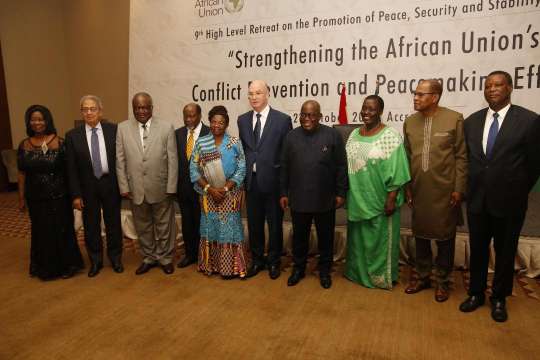 Africa’s objective of an integrated Africa cannot be achieved without peace and stability on the continent, President Nana Addo Dankwa Akufo-Addo has said.
Africa’s objective of an integrated Africa cannot be achieved without peace and stability on the continent, President Nana Addo Dankwa Akufo-Addo has said.
He stressed that the continent’s efforts at integration would be gloom-ridden if African states continued to battle with the human security challenges which confronted their peoples, saying, “No country would want to integrate with another whose house is on fire.”
Addressing the opening of the 9th High-Level African Union Retreat on the Promotion of Peace, Security and Stability in Africa in Accra on Thursday, the President advised that Africa took lessons from the over six decades of European integration and adopt the step-by-step determination of that continent for integration which had been successful in bringing peace, prosperity and development to the majority of Europe.
He said that it was a widely acknowledged fact that the formation of the European Union (EU) had helped, since the end of World War II in 1945, prevent war amongst its members.
“History teaches us that Austria, Britain, France, Germany and Italy had for centuries waged wars over religion, territory and power.
“The creation of a free market, concealing economic and geographical borders, was intended to erode the justification for using war as the quickest avenue to wealth and power, and lessen its appeal. That was the vision that underlay the idea behind the European Economic Community, now the EU, in 195.
“This should motivate us in Africa, and hasten our efforts towards integration. If Europe, through the formation of the EU, was able to stop the vicious cycle of violence that had plagued them for centuries, leading them onto the path of advancement, wealth and prosperity for the majority of their peoples, Africa can no longer dither,” the President stressed.
President Akufo-Addo urged African leaders to “work together to unleash the energy and ingenuity of the African”‘ adding, “with a market of 1.2 billion people, soon to reach two billion, the sky will be the limit”.
“Let us work towards the day when all of us will look to doing business first in our region and continent before looking to Europe, Asia or the Americas, because we have the men and women, the goods, the services and the quality”.
The President also asked African leaders to recognise that the way forward in the integration process was to implement regional and continental decisions, such as the Continental Free Trade Area Agreement, which would be in everyone’s interest.
“Those of us who believe strongly in integration can do no better than to give our full support to regional and continental decisions. Through this, we will build institutional confidence and integrity in the structural organs of the AU and our regional entities,” he added.
The two-day Accra meeting brings together representatives of regional economic communities and regional mechanisms for conflict prevention, management and resolution, to review the continental body’s existing instruments, partnership and practices and determine their suitability to manage current and future conflicts.
On the theme, “Strengthening Conflict Prevention and Peace-making Efforts,” the meeting draws participation from the Global body, the United Nations, as well as the European Union, La Francophonie, League of Arab States, and Bilateral partners.
The annual meeting promotes alternative perspectives on conflict resolution and Peace-making, with particular attention to second and third track mediation efforts by involving a large number of subnational actors, from grassroots community-based organisations to religious and traditional authorities.
President Akufo-Addo entreated the participants at the retreat to focus on the creation of conditions for the elimination of pervasive threats to peoples and individual rights, livelihoods, safety and life, through the protection of human and democratic rights, and the promotion of human development.
He noted that with over 50 percent of Africa’s population under the age of 20, African countries ought to create opportunities and jobs for its youth, or they risked becoming instruments of instability or targets of recruitment by terrorists.
To overcome this, there was need for African leaders and population to understand the critical importance of education.
“We must provide them with access to education; we must transform the structure of our economies from raw material producing and exporting economies to value-added and industrialised economies, which will provide opportunities, jobs and hope to our young people to live dignified, productive lives,” he added.
President Akufo-Addo also noted the critical importance of promoting and developing on the continent, a system and culture of accountable governance, free of corruption, where the people were governed in accordance with the rule of law, respect for individual liberties and human rights, and the principles of democratic accountability.
“Such a system includes; building strong institutions of state, such as well-resourced Parliaments and Judiciaries, efficient law enforcement agencies, and effective security forces, that see their responsibilities and allegiances to the wider public interest, not just to the conveniences of the governments of the day,” President Akufo-Addo emphasised.
Smail Chergui, the AU’s Commissioner for Peace and Security, who noted that the emerging peace and security challenges even after states had committed to multilateralism on the continent called for the “Strengthening of efforts towards ensuring our collective interests”.
Mohammed Ibn Chambas, Special Representative of the UN Secretary- General and head of the UN office for West Africa and Sahel, said Africa ought to strengthen its capacity to address the root causes of conflict, in all its forms, and stressed the need for partnerships based on shared values, mutual respect and solidarity among states.
GNA























